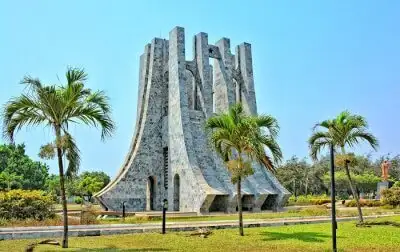As sustainability becomes a growing concern in travel, eco-conscious travelers are increasingly looking for destinations that offer a balance between adventure and environmental responsibility. Ghana, with its rich natural landscapes and commitment to preserving its biodiversity, offers several eco-friendly travel experiences. Here are the top sustainable travel destinations in Ghana that promise an unforgettable journey while being mindful of the planet.
1. Kakum National Park: A Canopy Walk Through Nature
Kakum National Park, located in the Central Region of Ghana, is an iconic eco-tourism destination known for its breathtaking canopy walk. This unique experience allows visitors to walk above the lush rainforest, offering views of the diverse flora and fauna below. The park is a protected area, ensuring that its biodiversity is preserved. Eco-conscious travelers can enjoy guided tours to learn about the park’s conservation efforts, including habitat protection and sustainable tourism practices.
Sustainable Practices: Kakum’s focus on responsible tourism involves maintaining natural habitats, limiting deforestation, and educating visitors on the importance of protecting endangered species. The park’s tourism revenue helps fund local community development and conservation initiatives.
2. Mole National Park: A Safari Experience with a Green Twist
Mole National Park, Ghana’s largest wildlife reserve, is an excellent destination for travelers who want to experience the wonders of the African wilderness while supporting sustainable tourism. Located in the northern part of the country, Mole is home to various wildlife, including elephants, lions, and antelopes. Visitors can take eco-friendly safaris led by experienced guides who emphasize wildlife protection and conservation efforts.
Sustainable Practices: Mole National Park has implemented sustainable practices such as low-impact safari tours, environmental education, and wildlife monitoring programs. The park also promotes community-based tourism, where local communities benefit from tourism revenue and participate in conservation initiatives.
3. Lake Bosumtwi: Nature and Culture in Harmony
Lake Bosumtwi, situated in the Ashanti Region, is the only natural lake in Ghana and holds cultural significance for the local communities. Eco-conscious travelers can visit the lake and explore the surrounding forest reserves while engaging with the indigenous communities that protect the area’s natural resources. The lake’s serene environment is perfect for eco-tourism activities such as hiking, birdwatching, and kayaking.
Sustainable Practices: The local communities around Lake Bosumtwi are committed to preserving the lake’s ecosystem through sustainable fishing practices and eco-friendly tourism initiatives. Visitors are encouraged to respect local customs and contribute to the conservation of the lake by avoiding waste and using biodegradable products.
4. Ada Foah: A Coastal Escape with a Focus on Conservation
Ada Foah, located at the estuary of the Volta River, is a lesser-known coastal paradise that attracts eco-conscious travelers seeking pristine beaches and peaceful surroundings. The region is home to various species of birds and marine life, making it an ideal destination for nature lovers and birdwatchers. The area has embraced sustainable fishing practices, and efforts are being made to protect its delicate ecosystems.
Sustainable Practices: Ada Foah has seen the rise of eco-friendly accommodations and community-led initiatives that focus on preserving the coastal environment. These initiatives include beach clean-ups, coral reef protection, and promoting eco-tourism as an alternative to mass tourism.
5. Wli Waterfalls: A Green Trek to the Highest Waterfall in West Africa
Wli Waterfalls, located in the Volta Region, is the tallest waterfall in West Africa. The surrounding area is rich in biodiversity, including several rare species of plants and birds. Eco-conscious travelers can take a guided trek through the lush rainforest, immersing themselves in the natural beauty while supporting conservation efforts in the region.
Sustainable Practices: Wli Waterfalls promotes eco-tourism through responsible hiking tours, which ensure minimal environmental impact. The community surrounding the falls is involved in conservation activities, such as reforestation and wildlife protection, to maintain the integrity of the ecosystem.
6. Nzulezo: The Unique Stilt Village
Nzulezo, a UNESCO-protected stilt village located along the Amansuri River in the Western Region, offers a one-of-a-kind cultural and eco-tourism experience. The village, which is built entirely on water, has a long history of sustainable living. Visitors can explore the village by canoe, learning about the traditional methods of fishing, farming, and building that have allowed the community to thrive while preserving the environment.
Sustainable Practices: Nzulezo’s community maintains its stilt houses and water-based lifestyle using eco-friendly techniques that respect the local environment. Sustainable tourism practices are promoted to ensure that the delicate ecosystem around the village remains protected for future generations.
7. The Volta River: Sustainable Adventure Activities
The Volta River offers a wide array of eco-friendly activities, including kayaking, paddleboarding, and birdwatching. Eco-conscious travelers can explore the river’s serene waters and nearby landscapes while supporting local communities that depend on the river for their livelihoods. Sustainable tourism initiatives in the region focus on preserving the river’s water quality and promoting eco-friendly recreation.
Sustainable Practices: The region has seen the implementation of sustainable tourism projects that focus on protecting the river’s biodiversity, reducing water pollution, and promoting community-based eco-tourism ventures. These initiatives contribute to the region’s environmental conservation while providing economic opportunities for local communities.
Conclusion
Ghana offers a wealth of eco-friendly travel destinations that combine natural beauty, cultural heritage, and sustainable practices. From the lush rainforests of Kakum to the tranquil waters of Lake Bosumtwi, eco-conscious travelers can enjoy a variety of activities that promote environmental responsibility. By choosing these sustainable destinations, travelers can contribute to the preservation of Ghana’s unique ecosystems while experiencing the country’s rich biodiversity and cultural traditions. Whether exploring the wild landscapes of Mole National Park or discovering the stilt village of Nzulezo, each eco-tourism destination in Ghana offers a chance to make a positive impact on the environment.
